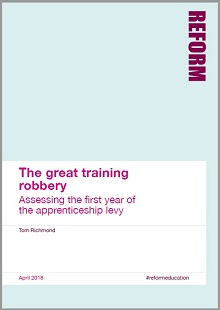Now that the apprenticeship levy has completed its first full year of operation, this report reviews the available evidence to determine whether the levy will, as the Government hopes, “incentivise more employers to provide quality apprenticeships” and “transform the lives of young people who secure them”.
In the six months after the levy was introduced (April – October 2017), the number of people starting an apprenticeship fell by 40 per cent compared to the same period in the previous year. A similar downward trend was also evident across November and December. In addition, more experienced and older workers are increasingly becoming the focus of the apprenticeship programme, at the expense of less experienced and younger employees. Alongside the levy, the Conservative Party remains committed to its 2015 manifesto pledge that 3 million people will start an apprenticeship by 2020. Commentators have consistently raised concerns over this target as it prioritises the quantity of apprenticeships rather than their quality.
The introduction of the levy has also diminished the quality of apprenticeships. The list of roles now officially counted as an ‘apprenticeship’ includes many low-skill and often very short training courses. These roles include serving customers in a delicatessen or coffee shop, working on a hotel reception desk, performing basic office administration and serving food and drink in a restaurant. Such training courses do not meet the historical or international definition of an apprenticeship because they typically offer minimal training, represent low-wage jobs and do not constitute skilled occupations.
Moreover, employers are using the levy to rebadge existing training courses as apprenticeships to shift the costs of training onto the Government instead. The most obvious examples of this relabelling are found in leadership and management skills. The list of the most popular apprenticeship standards includes becoming a ‘Team Leader’, ‘Supervisor’ or ‘Manager’. Cranfield University’s prestigious School of Management has even re-designated its existing Executive MBA as an apprenticeship to attract up to a 90 per cent government subsidy towards the programme costs.
Almost 40 per cent of the ‘apprenticeship standards’ approved by the Government since 2012 fail to reach the international or historical definition of an apprenticeship. These mislabelled courses are consuming over 20 per cent of the funding available for newly-designed apprenticeships. Without reform, in 2019-20 the Government will spend £600 million on courses incorrectly labelled as apprenticeships.
Employers have become increasingly critical towards the levy, primarily due to the burdens associated with accessing the levy funds as well as identifying and selecting training and assessment providers. The substantial increase in bureaucracy, plus several other issues, has led business groups to brand the levy ‘disastrous’, ‘confusing’ and ‘broken’. Furthermore, the Register of Apprenticeship Training Providers has been beset by difficulties and the Register of Assessment Organisations has also struggled to command the respect of stakeholders, with serious concerns being raised about its approach to quality assurance.
The opening page of the Government-sponsored Richard Review, published in 2012, observed that the growth in apprenticeship numbers in the preceding years had “led us to stretch the definition of what an apprenticeship is too far and, as a consequence, we risk losing sight of the core features of what makes apprenticeships work, what makes them unique.” Six years on, there is a real danger that the same mistakes could be made all over again. At present, the levy is too complicated for employers, focused on too many inappropriate forms of training and as a result is unlikely to deliver value-for-money. If the necessary changes described in this report are made then apprentices, taxpayers and employers across the country stand to benefit for many years to come.
BBC News – Firms relabelling low-skilled jobs as apprenticeships, says report
Financial Times – Poor quality apprenticeships set to waste £600m, says think-tank
The Times – Managers sent on degree courses as ‘apprentices’
City AM – Employers are rebranding low-skill work as “apprenticeships”, says report
The Independent – Employers relabelling low paid jobs as apprenticeships, new report says
The Independent – Apprenticeship ‘robbery’ report: Is poor policy trashing a good idea?
FE Week – Former adviser to two skills ministers blasts apprenticeship levy
TES – Calls to scrap courses that are ‘apprenticeships in name only’
APRIL 2018
